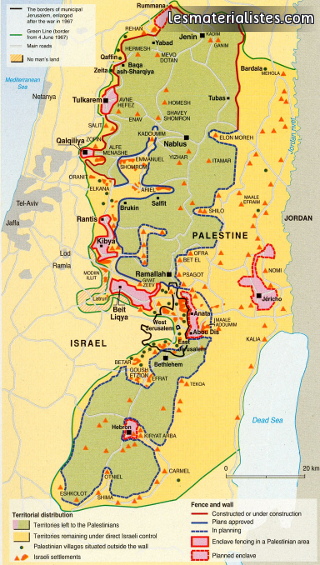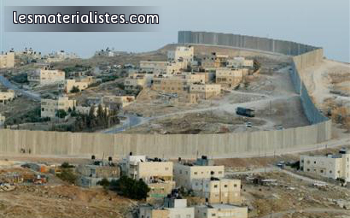Israel: what is the nature of its society and its state?
Submitted by Anonyme (non vérifié) Understanding the world requires tools provided by dialectical materialism. Without it, one comes to idealism. If we take Eugen Dühring for example, that Friedrich Engels criticized in a work famous under the title of the “Anti-Dühring”, we can see that after he opposed to Marxism, he developed a new idealist conception of socialism.
Understanding the world requires tools provided by dialectical materialism. Without it, one comes to idealism. If we take Eugen Dühring for example, that Friedrich Engels criticized in a work famous under the title of the “Anti-Dühring”, we can see that after he opposed to Marxism, he developed a new idealist conception of socialism.
As it needed an anti-capitalist dimension, Dühring formulated the modern “social” anti-Semitic racial theory where the “Jews” would form a parasitic people that was to exterminate, as even bringing them to a ghetto wouldn't be enough, because the Jews were, according this racist conception, “nomads”, or would even use their new territory to conquer the world.
The huge significance of the fact that Dühring formulated the basis of what would be later historically “national socialism” - class collaboration in the consideration that only the Jews were the “class” exploiting – has never been studied until yet. This is a very bad thing, as we can see here how “national socialism” is born directly in confrontation with dialectical materialism.
“National-socialism” is no German “deformation”, but the radical counter-revolutionary answer to dialectical materialism affirming the dialectics of nature and calling to resolve the manual/intellectual labor and the city/countryside contradictions.
Naturally, this plays a central role in the understanding the nature of the Israeli state and society. Without dialectical materialism, idealism prevails. For some Israel is the “only democratic state in the Middle East”, for others it is only a “Zionist entity”. Some others talk also from the “Israeli imperialism”, and anyway we can easily find anti-Semitic conceptions, seeing Israel as manipulating the others regimes in the world, controlling the USA, practising “Nazi like” genocides, etc.
All of this is basically the same position as Eugen Dühring's one, seeing “the Jews”, and here Israel, as inhuman, forming a special category, etc. According dialectical materialism, on the other side, there is no “special category”. Islamist, Christian fascist, Jewish nationalist ideologies and Anti-Semitism can get hysterical and irrational with this question, because of its “special” character. This is not the position of materialism.
So, what is Israel according dialectical materialism? In fact, there are only two solutions: either is Israel an imperialist country, or it is semi-colonial semi-feudal.
The facts speak for themselves. The Zionist ideology is not born as a religious one, but it used very soon religion to legitimate the colonization of Palestine and then the expansion of the state and the primacy of the Jews in the front of an important Arab minority living in the country. More and more the religious aspect grew, with strong theocratic tendencies, with an ultra-nationalist irrational hegemony as well.
This is not democratic at all and it is logical as historically the new state of Israel, born in 1948, didn't have a bourgeoisie having made a democratic revolution. In fact, since the beginning the bourgeoisie took a bureaucratic form: the state was formed not from below, by the immigrants, but directly by bureaucratic organisms, like the trade-union Histadrout, the Jewish Agency, etc.
These organisms were directly backed by the US imperialism. First of all, it was West-Germany, then depending of the US imperialism, that furnished money, from 1952 to 1966, forming even 87,5% of the total Israeli income of 1956. Then, it was the US imperialism who backed financially the Israeli state, with 233 billion of dollars since 1948.
The USA still gives to Israel 3 billion $ each year as military assistance (74% of it must be spent in the USA).

So, Israel was carried by the US imperialism, and logically its economy is dependent of foreign capital. Investments banks are massively present, with for example Sequoia, Benchmark Capital, Credit Swiss-First Boston, etc., but there are also pension funds and insurance companies, like CalPERS, US Teacher's Union, AIG, AON, Marsh & McLennan, etc.
Israel hosts 300 foreign companies sites, with for example Intel, Cisco, Hewlett-Packard, Motorola, Texas Instruments, Siemens, IBM, etc., because venture capital plays here a very important role. It grew from $58 million in 1991 to $3.3 billion in 2000, mainly of course in the high technology fields: Israel had then 70% of the world ventures in high-tech, and was at the first place for expenditures in Research and Development as percentage of the GDP.
The Israeli economy depends clearly of the imperialist states, as we can see that with the crisis the Venture capital knew changes: venture capital in high-tech raised to 1,26 billion $ in 2010 to 2,14 billion $ in 2011, before stepping down to 607 millions $ in 2012.
That's why there is a central university like the “Technion” in Haifa, already founded in 1912, and an important number of engineers: 140 for 10 000 workers (there are 88 in Japan, 85 in the US, 60 in Germany). The Israeli state dreams of itself as a « silicon wadi » (wadi meaning “valley” in Arab), alluding to the Silicon Valley in California.
It is here to remember that during the 1990's, 750,000 scientists, engineers, and physicians from the former Soviet Union emigrated to Israel; if we compare the number of scientific publications per million citizen's, the Israeli state and society take the fourth rank.
The Israeli state and society are a high tech lab, in the form of a semi-colonial semi-feudal country. It is not “imperialist”. But it is expansionist, it is a semi-colonial semi-feudal country of the expansionist type, like described in Afghanistan by Akram Yari, in Bangladesh by Siraj Sikder, in Turkey by Ibrahim Kaypakkaya.
This expansionism, based in the very core of Zionism because the presence itself in Palestine is colonial, strengthened the feudal dimension, with the repression and the domination of the Arabs of Palestine.
This is why in its substance, the Israeli state and society are very weak: they depend of the foreign aid and investments on one side – with also more than 20% of the population below the poverty line -, the feudal oppression of colonization faces logically resistance on the other side. The democratic revolution is unavoidable, and we can see here that the anti-feudal dimension puts in a central role the Palestinian National Movement.
This is here the sense of a democratic revolution suppressing the nationalist Jewish national character of the Israeli state and giving birth to a state and a society of New Democracy in Palestine.Understanding the world requires tools provided by dialectical materialism. Without it, one comes to idealism. If we take Eugen Dühring for example, that Friedrich Engels criticized in a work famous under the title of the “Anti-Dühring”, we can see that after he opposed to Marxism, he developed a new idealist conception of socialism.
As it needed an anti-capitalist dimension, Dühring formulated the modern “social” anti-Semitic racial theory where the “Jews” would form a parasitic people that was to exterminate, as even bringing them to a ghetto wouldn't be enough, because the Jews were, according this racist conception, “nomads”, or would even use their new territory to conquer the world.
The huge significance of the fact that Dühring formulated the basis of what would be later historically “national socialism” - class collaboration in the consideration that only the Jews were the “class” exploiting – has never been studied until yet. This is a very bad thing, as we can see here how “national socialism” is born directly in confrontation with dialectical materialism.

“National-socialism” is no German “deformation”, but the radical counter-revolutionary answer to dialectical materialism affirming the dialectics of nature and calling to resolve the manual/intellectual labor and the city/countryside contradictions.
Naturally, this plays a central role in the understanding the nature of the Israeli state and society. Without dialectical materialism, idealism prevails. For some Israel is the “only democratic state in the Middle East”, for others it is only a “Zionist entity”. Some others talk also from the “Israeli imperialism”, and anyway we can easily find anti-Semitic conceptions, seeing Israel as manipulating the others regimes in the world, controlling the USA, practising “Nazi like” genocides, etc.
All of this is basically the same position as Eugen Dühring's one, seeing “the Jews”, and here Israel, as inhuman, forming a special category, etc. According dialectical materialism, on the other side, there is no “special category”. Islamist, Christian fascist, Jewish nationalist ideologies and Anti-Semitism can get hysterical and irrational with this question, because of its “special” character. This is not the position of materialism.
So, what is Israel according dialectical materialism? In fact, there are only two solutions: either is Israel an imperialist country, or it is semi-colonial semi-feudal.
The facts speak for themselves. The Zionist ideology is not born as a religious one, but it used very soon religion to legitimate the colonization of Palestine and then the expansion of the state and the primacy of the Jews in the front of an important Arab minority living in the country. More and more the religious aspect grew, with strong theocratic tendencies, with an ultra-nationalist irrational hegemony as well.
This is not democratic at all and it is logical as historically the new state of Israel, born in 1948, didn't have a bourgeoisie having made a democratic revolution. In fact, since the beginning the bourgeoisie took a bureaucratic form: the state was formed not from below, by the immigrants, but directly by bureaucratic organisms, like the trade-union Histadrout, the Jewish Agency, etc.
These organisms were directly backed by the US imperialism. First of all, it was West-Germany, then depending of the US imperialism, that furnished money, from 1952 to 1966, forming even 87,5% of the total Israeli income of 1956. Then, it was the US imperialism who backed financially the Israeli state, with 233 billion of dollars since 1948.
The USA still gives to Israel 3 billion $ each year as military assistance (74% of it must be spent in the USA).
So, Israel was carried by the US imperialism, and logically its economy is dependent of foreign capital. Investments banks are massively present, with for example Sequoia, Benchmark Capital, Credit Swiss-First Boston, etc., but there are also pension funds and insurance companies, like CalPERS, US Teacher's Union, AIG, AON, Marsh & McLennan, etc.
Israel hosts 300 foreign companies sites, with for example Intel, Cisco, Hewlett-Packard, Motorola, Texas Instruments, Siemens, IBM, etc., because venture capital plays here a very important role. It grew from $58 million in 1991 to $3.3 billion in 2000, mainly of course in the high technology fields: Israel had then 70% of the world ventures in high-tech, and was at the first place for expenditures in Research and Development as percentage of the GDP.
The Israeli economy depends clearly of the imperialist states, as we can see that with the crisis the Venture capital knew changes: venture capital in high-tech raised to 1,26 billion $ in 2010 to 2,14 billion $ in 2011, before stepping down to 607 millions $ in 2012.
That's why there is a central university like the “Technion” in Haifa, already founded in 1912, and an important number of engineers: 140 for 10 000 workers (there are 88 in Japan, 85 in the US, 60 in Germany). The Israeli state dreams of itself as a « silicon wadi » (wadi meaning “valley” in Arab), alluding to the Silicon Valley in California.
It is here to remember that during the 1990's, 750,000 scientists, engineers, and physicians from the former Soviet Union emigrated to Israel; if we compare the number of scientific publications per million citizen's, the Israeli state and society take the fourth rank.
The Israeli state and society are a high tech lab, in the form of a semi-colonial semi-feudal country. It is not “imperialist”. But it is expansionist, it is a semi-colonial semi-feudal country of the expansionist type, like described in Afghanistan by Akram Yari, in Bangladesh by Siraj Sikder, in Turkey by Ibrahim Kaypakkaya.
 This expansionism, based in the very core of Zionism because the presence itself in Palestine is colonial, strengthened the feudal dimension, with the repression and the domination of the Arabs of Palestine.
This expansionism, based in the very core of Zionism because the presence itself in Palestine is colonial, strengthened the feudal dimension, with the repression and the domination of the Arabs of Palestine.
This is why in its substance, the Israeli state and society are very weak: they depend of the foreign aid and investments on one side – with also more than 20% of the population below the poverty line -, the feudal oppression of colonization faces logically resistance on the other side. The democratic revolution is unavoidable, and we can see here that the anti-feudal dimension puts in a central role the Palestinian National Movement.
This is here the sense of a democratic revolution suppressing the nationalist Jewish national character of the Israeli state and giving birth to a state and a society of New Democracy in Palestine.
